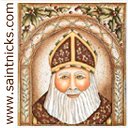One of the more ironic things as about the current controversy in the Episcopal Church is the way the dissidents – those who have departed or who are threatening to depart from the ECUSA – define their theological terms. They tend to describe themselves as “orthodox” and “traditionalists,” while accusing the Episcopal Church of “heretical” and “revisionist.” But are they using those terms honestly and correctly?
What is Orthodoxy?
These days, when people employ the term orthodoxy, the tend think in terms of a set of correct or acceptable beliefs or doctrines. But the term originally – and literally – meant “right praise.” At its inception, the Church was less of an organized religion than a movement: a way of life centered around the person of the Risen Christ. In fact, the first name the Church applied to itself was “The Way” and the original Greek word for Church literally meant “called out” or “the called ones.” But once it became clear that Christ would not return in their lifetimes, the Church had struggle with the issue of how to pass on the authentic experience and core meaning of the relationship with Christ. As one of my seminary professors once put it, the question was: “What things were so crucial to the story of Jesus Christ, that if they were not there – or if something else were there in their place – it would be a different story?” Over a relatively short time, the focus narrowed to a few key statements, which came to be known as the kerygma (lit. “Key”) – that form the core of the faith:
- God in Christ fulfills the scripture.
- God became incarnate in Jesus Christ.
- Christ was crucified.
- Christ was buried.
- Christ rose again.
- Christ was exalted to God.
- God gave us the gift of the Holy Spirit.
- There will be a day of judgment.
- Therefore, repent.
If this begins to sound familiar, it is because these went on to become the basic building blocks of the Apostles Creed sometime in the second century, which was further developed into the form of the Nicene Creed by the fourth century. If you read even these later documents carefully, you will find they more map out the outside boundaries of orthodoxy than they specifically define it. Jesus must be both fully human and fully God, without confusion, change, division, or separation, two natures together in one person (prosopon) and one hypostasis. But precisely how this paradox is achieved is left an indefinable mystery. Similarly, God is recognized as a complex unity – three distinct persons or personalities within one undivided Godhead – but the paradox itself left again left an undefined mystery. Perhaps it was precisely because they knew were dealing with essentially indefinable mystery, that they explained these things in terms that were essential criteria rather than definition. Which is also perhaps why another one my seminary professors once offered this tongue-in-cheek operational definition of dogma: “This is as good as it’s gonna get, so lets stop arguing about it.”
The Traditional Anglican/Episcopal of Orthodoxy
The Anglican approach to orthodoxy is creedal, rather than confessional. What that means is that Anglicans have traditionally been very reluctant to add any requirements to orthodoxy beyond the criteria of the kerygma as reflected in the ancient creeds. Anglicans have never required its members to individually “confess” or “sign on to” to an extensive statement of personal beliefs as a condition of membership in the Church. In large part, this is because the founders of Anglicanism observed what was the sadly ironic effects of such an approach: the wider the number of doctrines to which the Church requires agreement, the more the Church splinters and the more its sad divisions increase.
The way Richard Hooker, one of the founders of Anglicanism, put it was that what made a person a Christian was that the acknowledged Christ as the savior. Failure to believe a necessary implication of that acknowledgement did not make a person a non-Christian. It might make them wrong, but it doesn’t make them not a Christian. According to Hooke, even heretics ought to be considered Christians: wounded and in need of our prayers, but still Christians. The traditional Anglican approach to orthodoxy is nicely summed up in this statement attributed to St. Augustine of Hippo, “In essentials, unity. In non-essentials, liberty. In all things, charity (love).”
An Ironic Conclusion
So while the dissidents may prefer to call themselves orthodox traditionalists, the tradition of orthodoxy which they are trying to promote – and from which they accuse the Episcopal Church of deviating – is not the traditional Anglican approach to orthodoxy. And for that matter, neither was it the tradition of the early Church. Ironically, in light of the accusations of the dissidents, if the Episcopal Church were to accede to their demands for a broad and confessional definition of orthodoxy, then they really would be guilty of revisionism.









